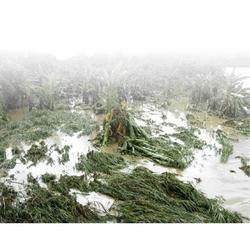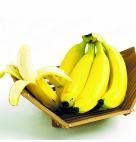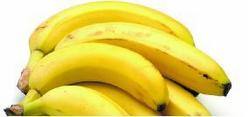
A waterlogged section of the St Mary Banana Estate after Tropical Storm Gustav. - File photos
Last September it required some persuasive talking, if not arm-twisting by the government to persuade Jamaica Producers Group to continue in export banana production in Jamaica.
A soft loan for crop insurance was not an unimportant part of the Government's argument.
A year later, with Tropical Storm Gustav having severely damaged a hefty portion of its 1,500 acres of banana farms in eastern Jamaica, Producers Group is again contemplating its future in growing the fruit here.
Deeper introspection
The deeper introspection follows Gustav, which decimated one farm and claimed 30-60 per cent of the other.
Group Managing Director Jeffrey Hall has already signalled that the company is inclined to scale back on exports from Jamaica, an activity it resumed just months ago after rebuilding its crops.
The company was unable to confirm immediately whether its weekly shipment would make it out this week.
JP, however, wants to maintain its Fairtrade market, but the designation is location specific and was linked to its Jamaican operation.
On that basis, it's unlikely the company can supply the UK market from Honduras.

Hall
Hall admits that it is issues like this that makes the decision about the Jamaican farms a difficult one, even though bananas now are only a small part of the conglomerate's operation - accounting for $2 billion of $13.8 billion in its 2007 year.
Market assessment
JP's directors and managers are to bring down the gavel either way soon on the role of the Jamaican farms in the wider group.
"We are meeting this week to see how the export market is handled taking into account our marketing position," Producers Group CEO, Jeffrey Hall told Wednesday Business.
"We were out of the export market and just restarted."
But whatever happens, Producers will be putting more money and effort into the production of cassava chips, providing a fillip to a crop being promoted by the agriculture minister, Christopher Tufton.
Cassava chips

With bananas likely to be in short supply in the short term, JP will be investing $5 million to transform about 20 per cent of its local banana snack business into cassava chips production by mid-October
"We took a decision to fast-track the launch of cassava chips," Hall said. "We did this in (Hurricane) Ivan (in 2004) and it was successful, so we are going to ramp it up now."
Producers Group, which controls about a third of the banana market in Britain, grows about 80 per cent of the fruit exported from Jamaica. It also grows bananas in the Central American country of Honduras.
But growing bananas in Jamaica has been frustrating for JP and other producers, who have seen output decline sharply over the last two decades to 32,000 tonnes a year ago.
First, there were diseases, like the black sigatoka that attacked banana plants and eroded production. A series of storms and hurricanes that blew down plantations has not helped.
Such problems have been exacerbated by the erosion of markets in the European Union because of challenges at the World Trade Organisation (WTO) by Latin American producers to preferences offered by the EU to banana producers in the African, Caribbean and Pacific (ACP) group of countries.
Incompatible regime
WTO arbitration panels have several times ruled that the EU's regime is incompatible with world trade rules and inveighed against adjustments proposed by the Europeans that maintain a level of security for ACP countries, including small producers in the Caribbean.
The EU is challenging the most recent ruling, but Jamaican operators here have already said that whatever the outcome of the 'banana war', the country is not hanging its hat on the crop.
Growers see potential in a strong domestic market that consumes about 80,000 tonnes per year or triple the amount of exports.
Latin American growers

Large farm sizes and cheap labour help make Latin American growers more efficient banana growers than their competitors in the Caribbean.
The frequent need to replant farms after hurricanes worsens the situation for countries like Jamaica.
After Hurricane Dean struck Jamaica last year, it took several months before the island's growers could ship bananas again to Britain.
Now, JP's farms in Golden Grove, St Thomas and Annotto Bay, St Mary, are largely in tatters.
The company is now assessing how much bananas it might have to export from Jamaica for the rest of the year. For now, though, the company hopes to entice Jamaicans to add cassava chips to the snack diet.
Hall is confident this will happen.
A recent survey, he said, had shown that while people were sceptical at first about cassava chips, they became "excited about the product once they tried it".
susan.gordon@gleanerjm.com



